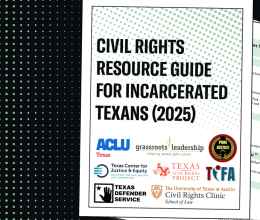
Condemning Aaron Hart of Paris, TX to 100 Years in State Prison Is “Cruel and Unusual Punishment”
FOR IMMEDIATE RELEASE
Contact: Dotty Griffith, Public Education Director, ACLU Foundation of Texas, (512) 478-7300 x 106 or 923-1909; [email protected]
GREENVILLE – Today the American Civil Liberties Union (ACLU) of Texas submitted an amicus brief in the appeal of Aaron Hart, a severely mentally retarded teen, sentenced to 100 years in prison in a sexual abuse case.
Download the Amicus brief by the ACLU of Texas (PDF)
Download the Amicus brief by Advocacy Inc. (PDF)
Download the Appellee's brief (PDF)
Download the Appellant's brief (PDF)
Because of the circumstances and the harsh sentence, the case has drawn national attention to the northeast Texas town of Paris. The appeal will be heard Wednesday, April 14, at 11 a.m. in nearby Greenville, Texas before the Sixth Court of Appeals. Hart was convicted of performing sexual acts on a younger neighbor.
“The crime Aaron Hart reportedly committed is offensive,” said Lisa Graybill, Legal Director of the ACLU of Texas. “But sentencing him to 100 years in prison, when similar or significantly more brutal offenders routinely receive far lighter sentences from Texas courts, suggests that Hart is being punished not for his crime, but for his status as a severely retarded individual. This the Constitution forbids.”
Citing “evolving standards of decency” and the 8th Amendment’s prohibition on cruel and unusual punishment, the U.S. Supreme Court has recently eliminated the death penalty for juveniles and for the mentally retarded. A case currently pending in the US Supreme Court is challenging the imposition of life without parole for juvenile offenders.
“The law recognizes that juveniles and mentally retarded individuals are less able to distinguish between right and wrong, and therefore should not be subjected to the harshest punishment,” added Graybill. The brief cites cases of more violent offenses, including murder, in which the accused routinely received lesser sentences than Hart's.
Hart’s appellate attorney, David Pearson, has challenged his client’s conviction on the grounds that Hart’s court-appointed attorney did not provide adequate representation during trial. Following the trial, 6th District Court Judge Eric Clifford said he would have preferred not to send Hart to prison but he “did not know where else to put” him. State care facilities and group homes for disabled offenders were not presented as options.
The ACLU of Texas brief, filed with cooperating counsel Gibson, Dunn and Crutcher, LLP, in Dallas, asks the appellate court to consider 8th Amendment issues as well.
The amicus brief asks the court to remand the case for re-sentencing; Hart’s appellate attorney is seeking re-trial. If the lower court’s decision is upheld, Hart will not be eligible for parole until age 68.






